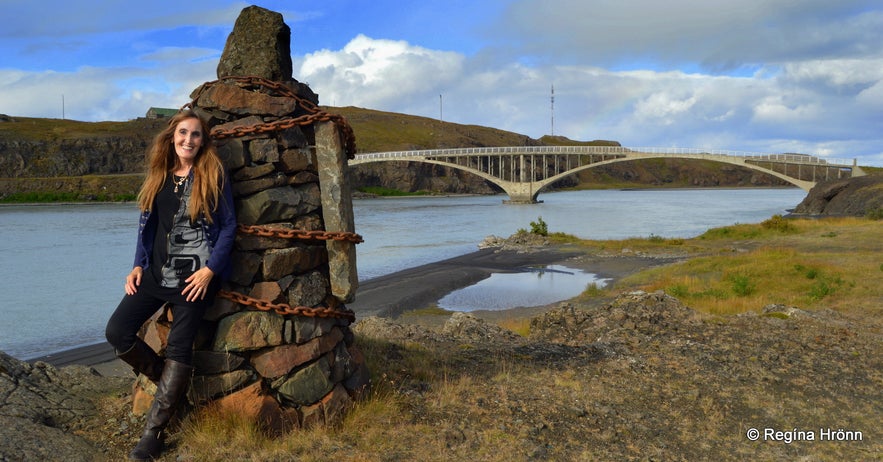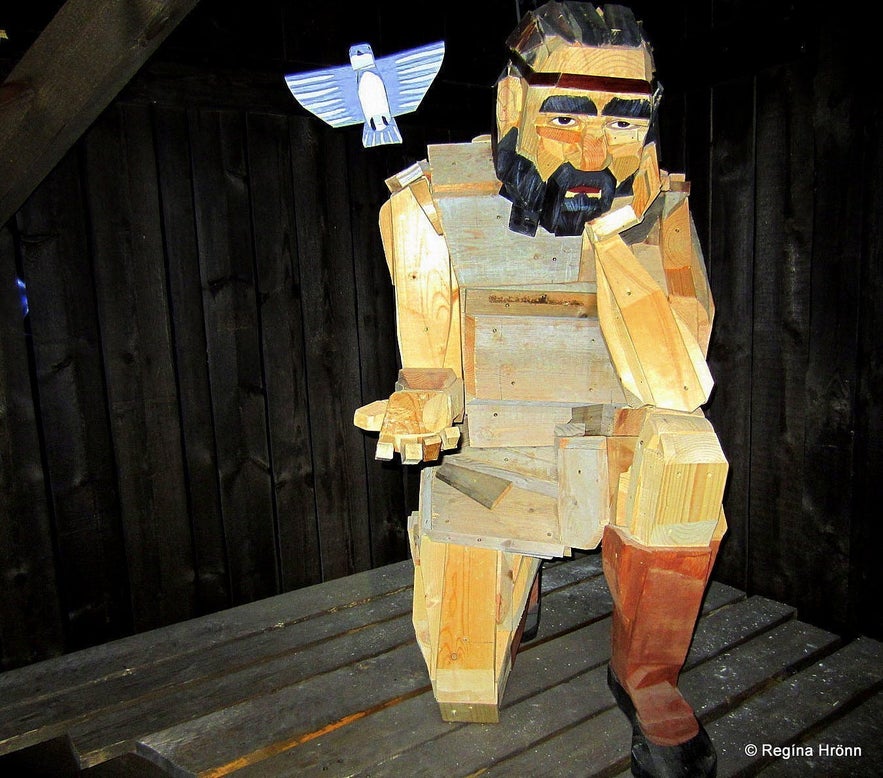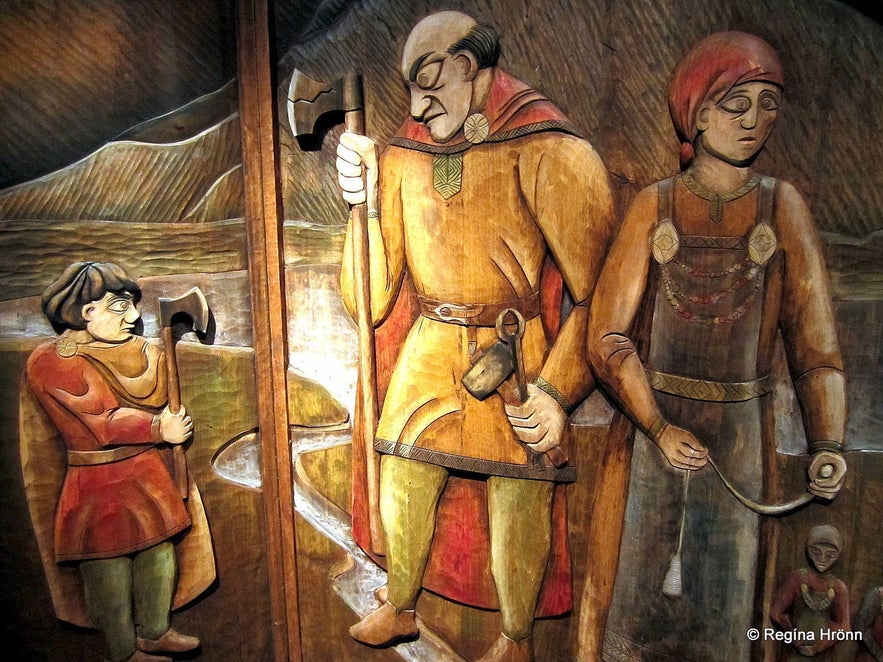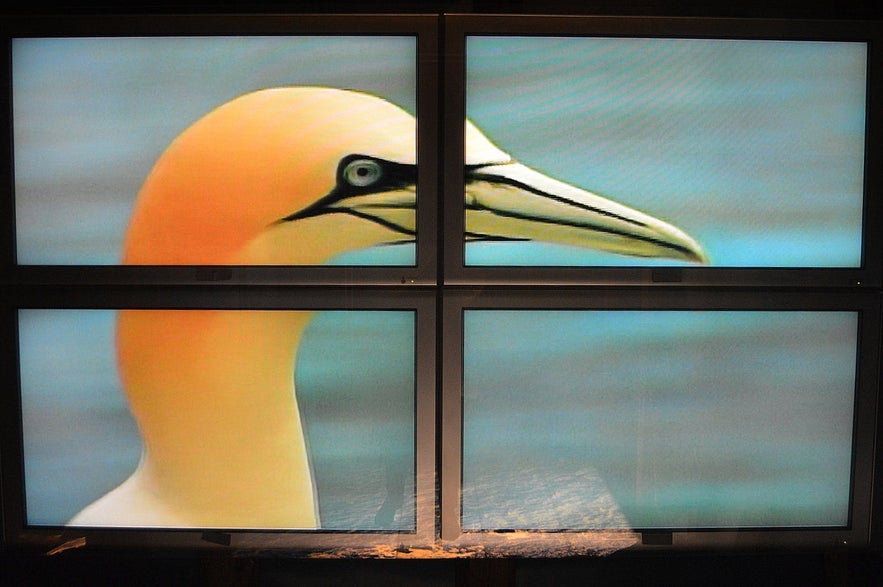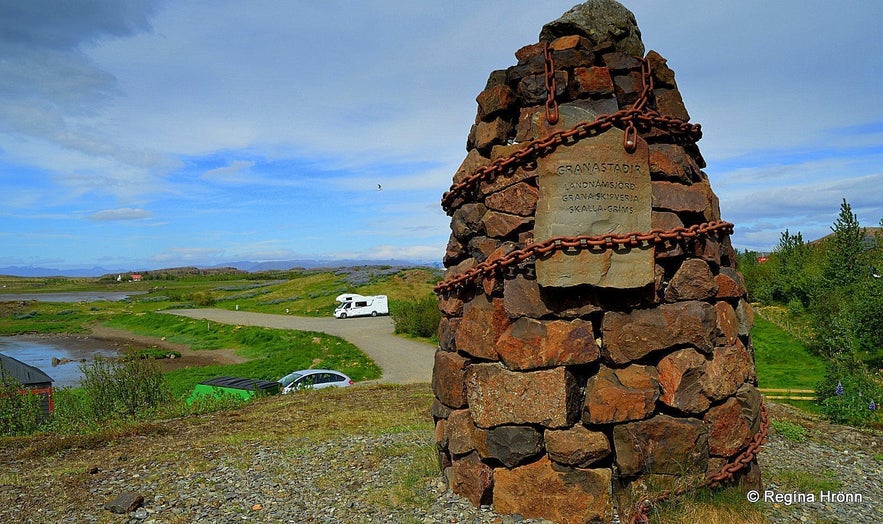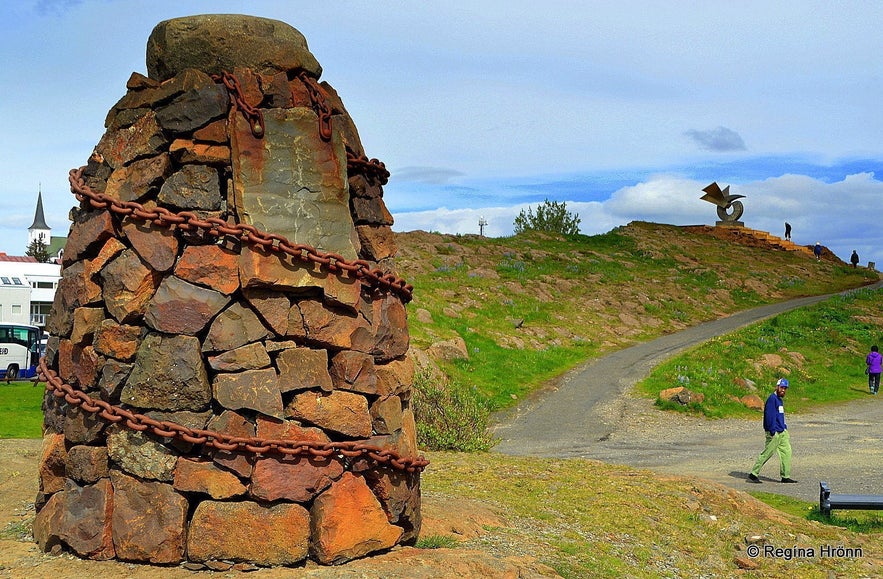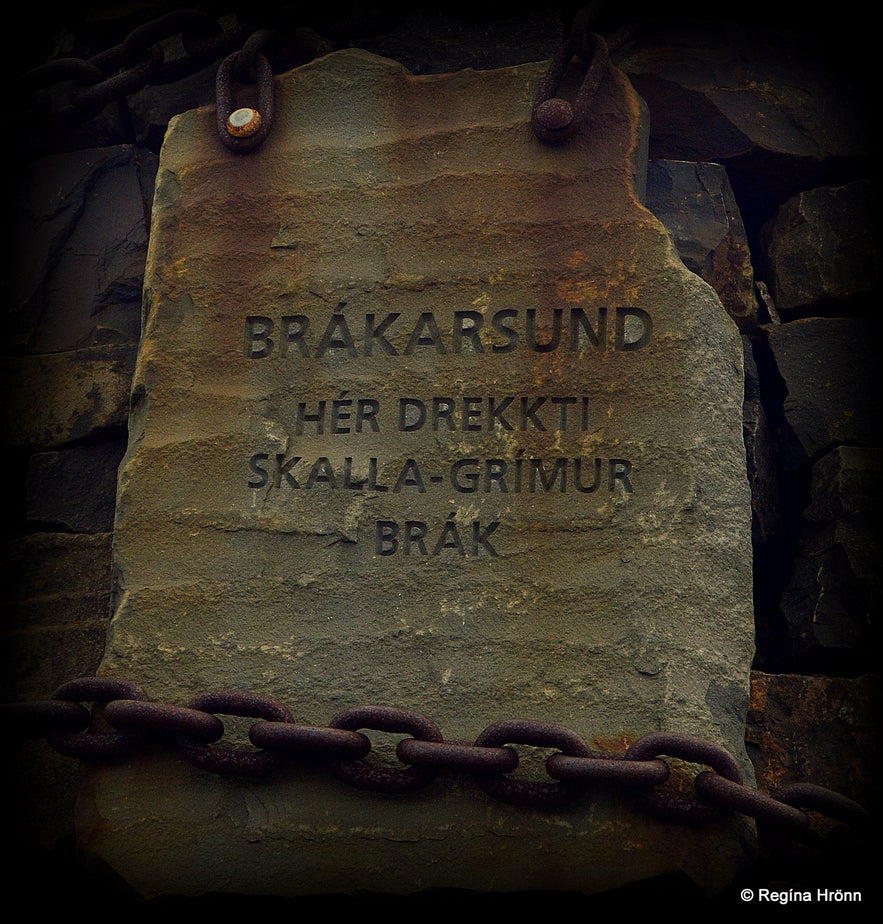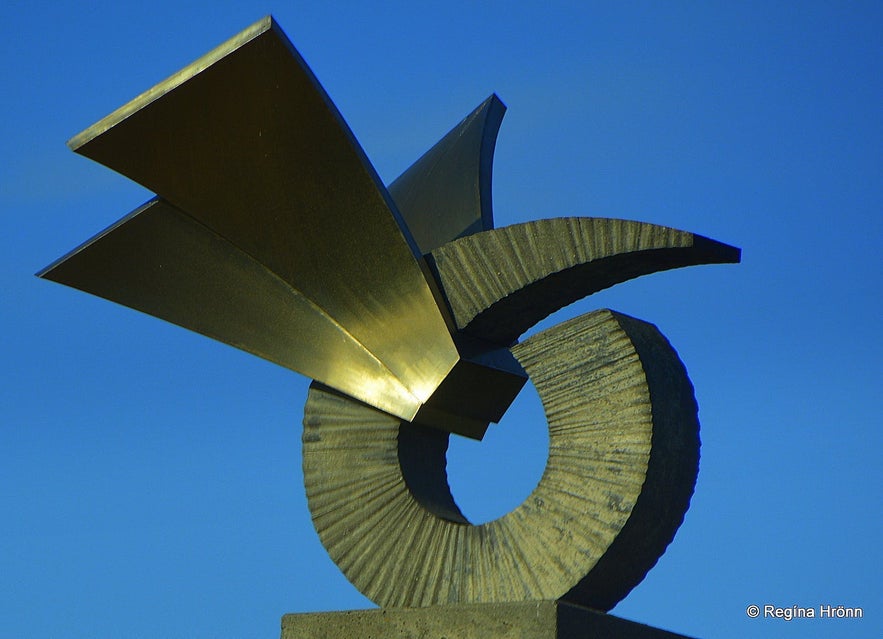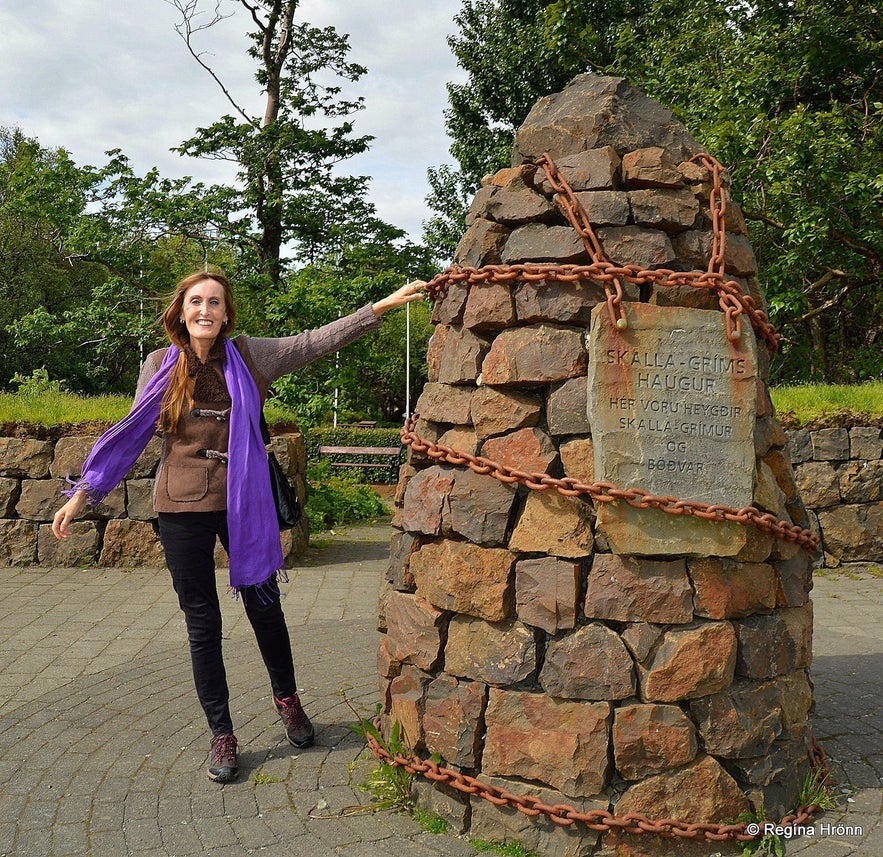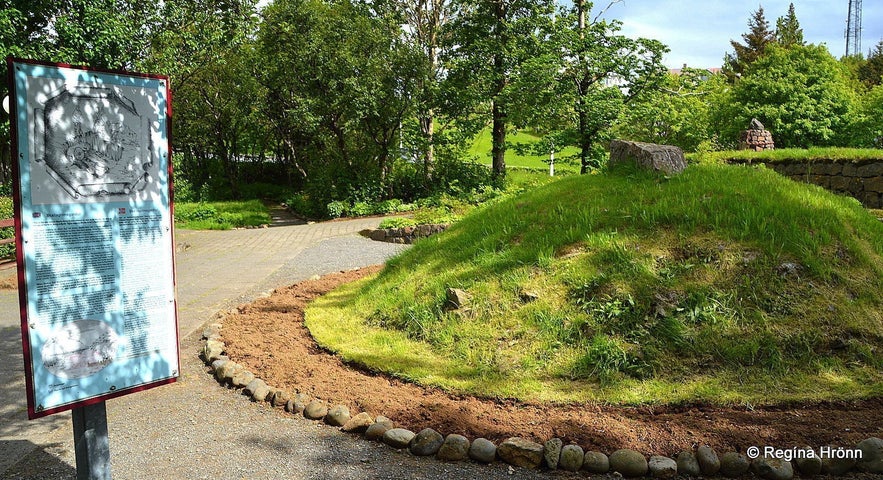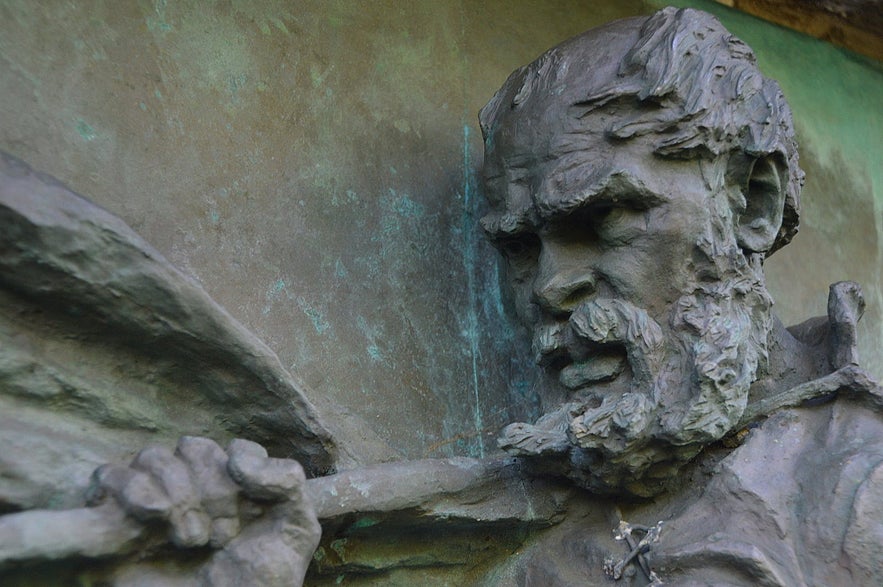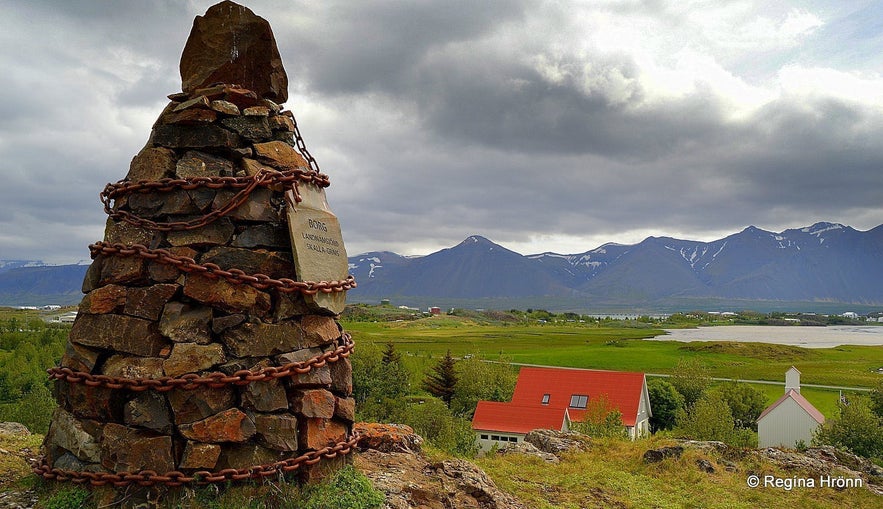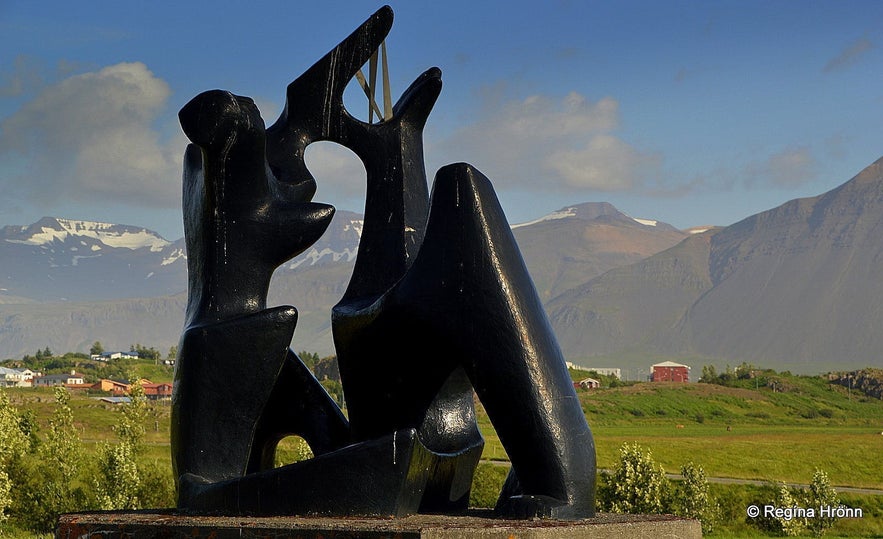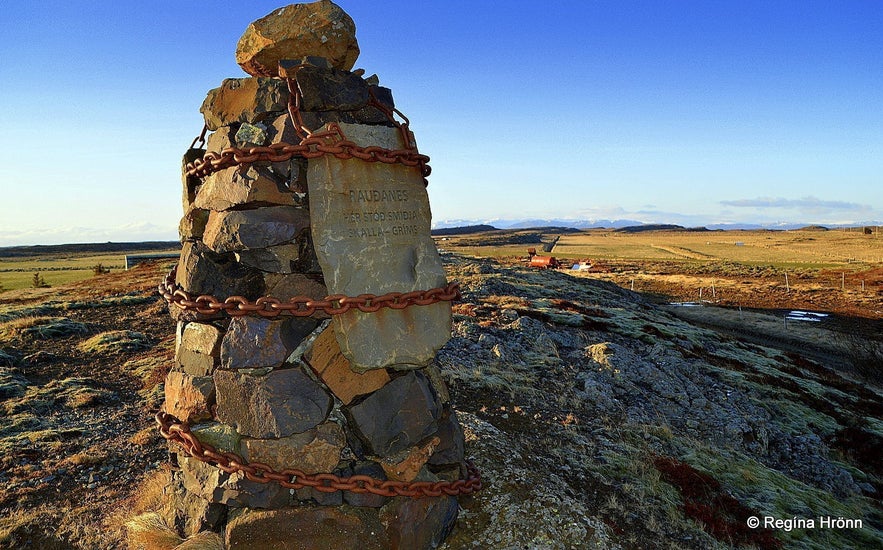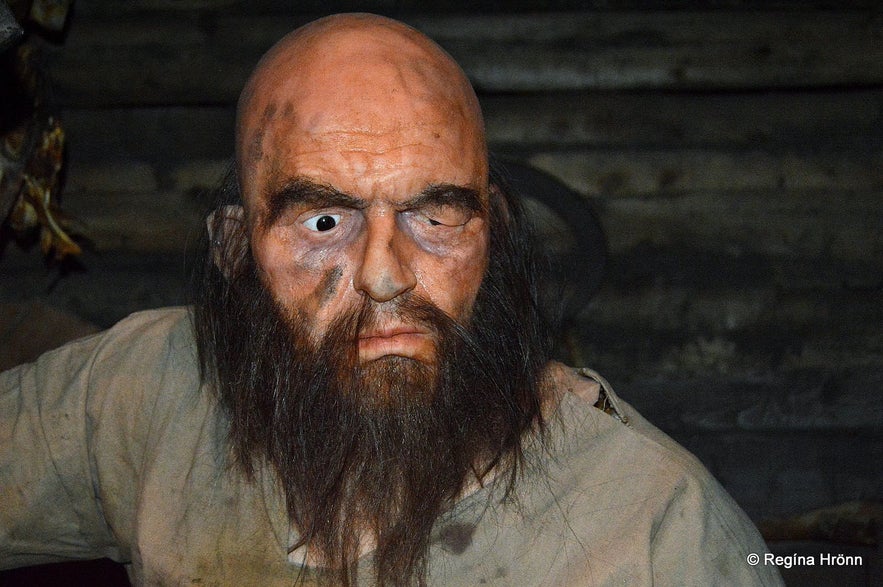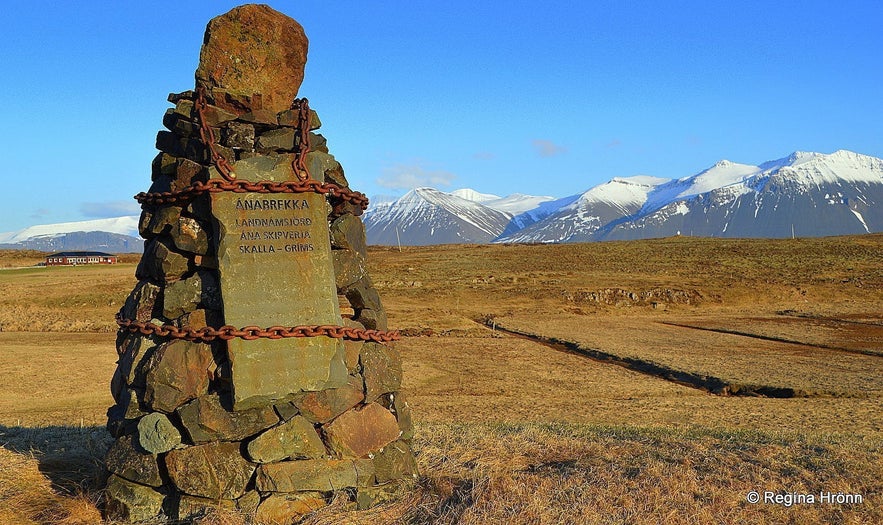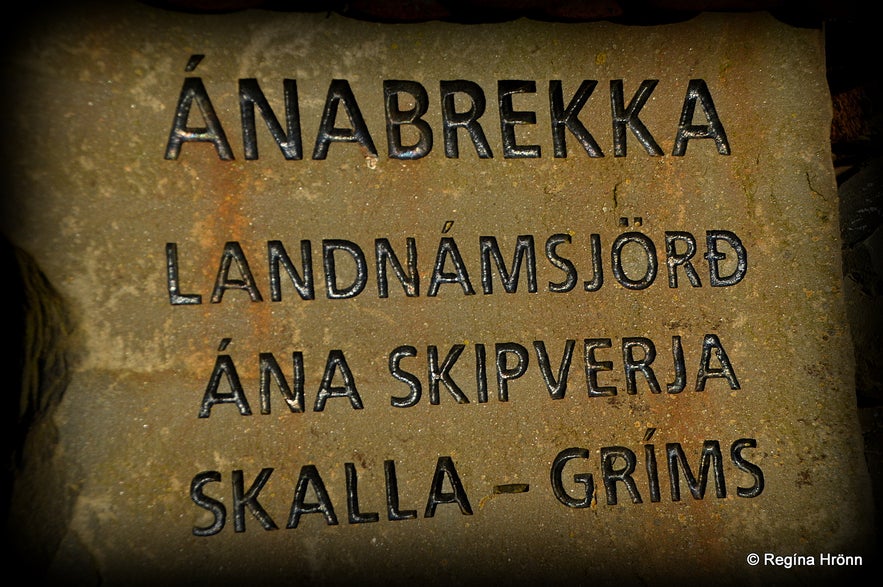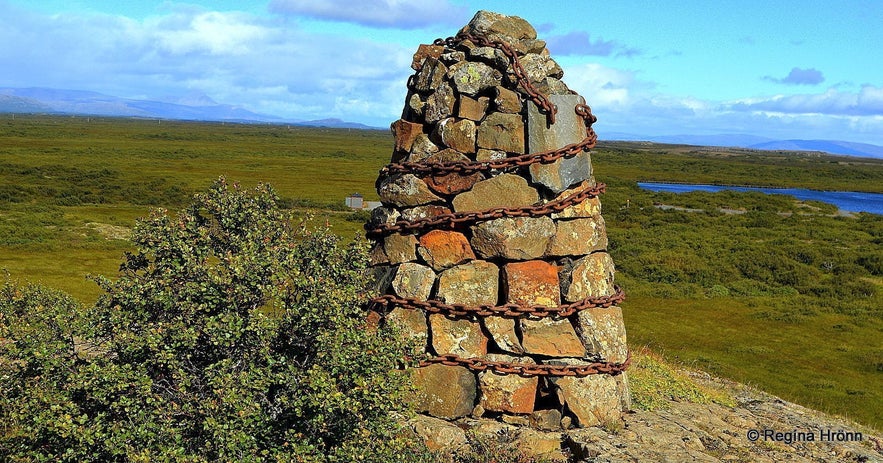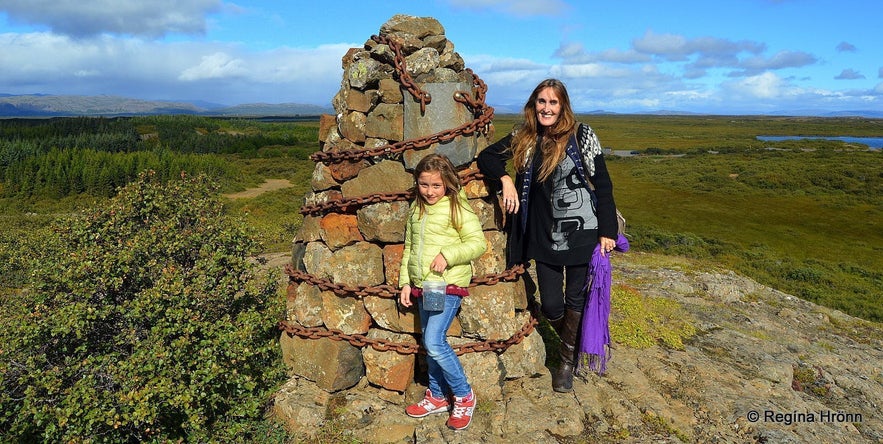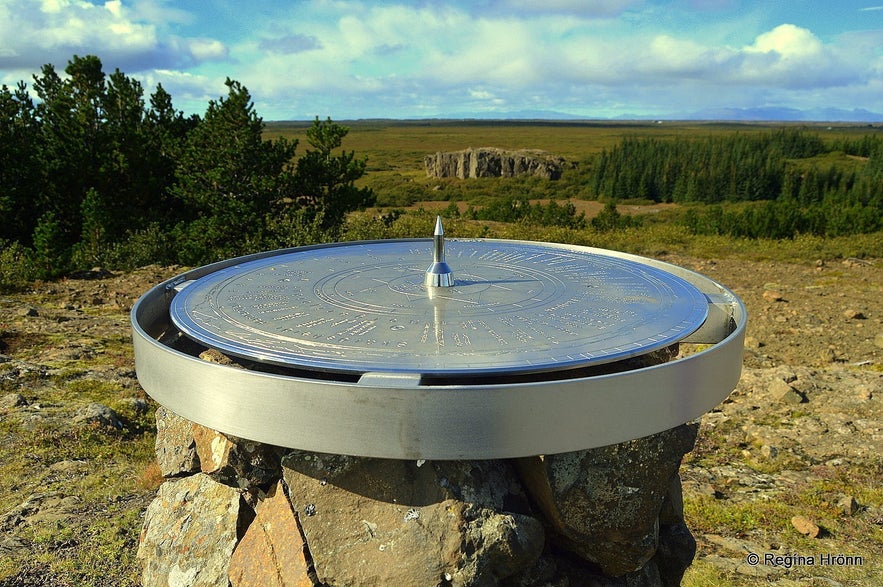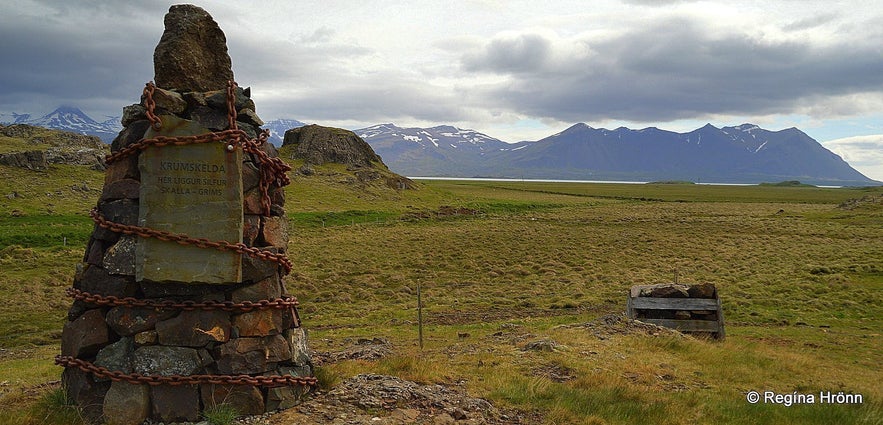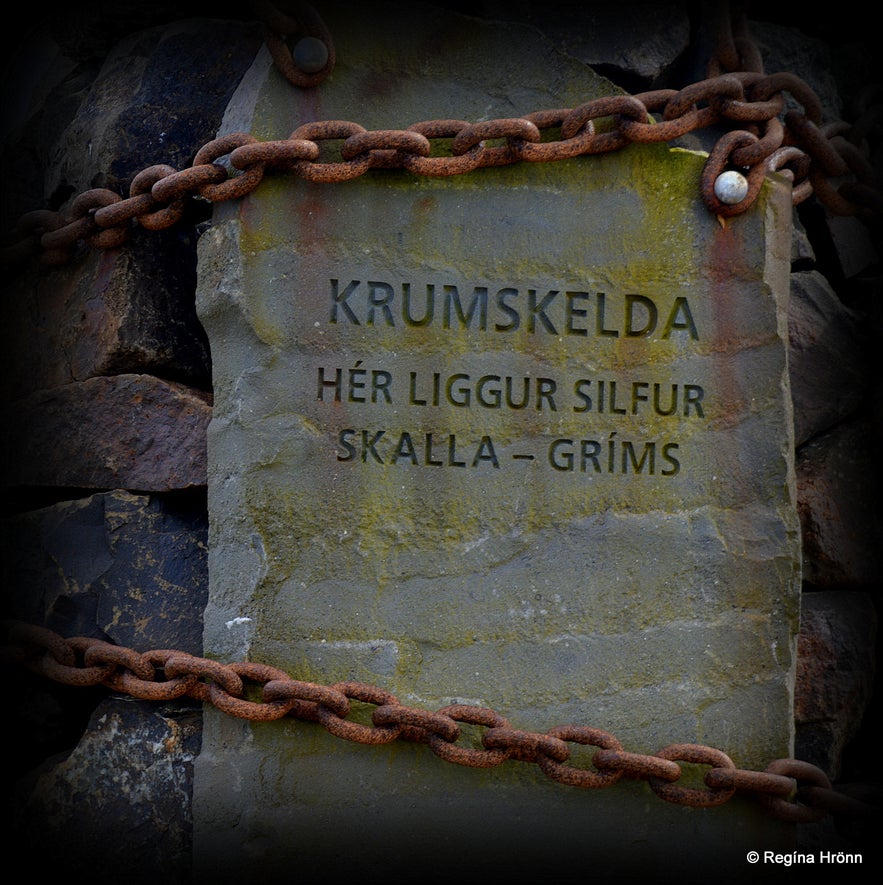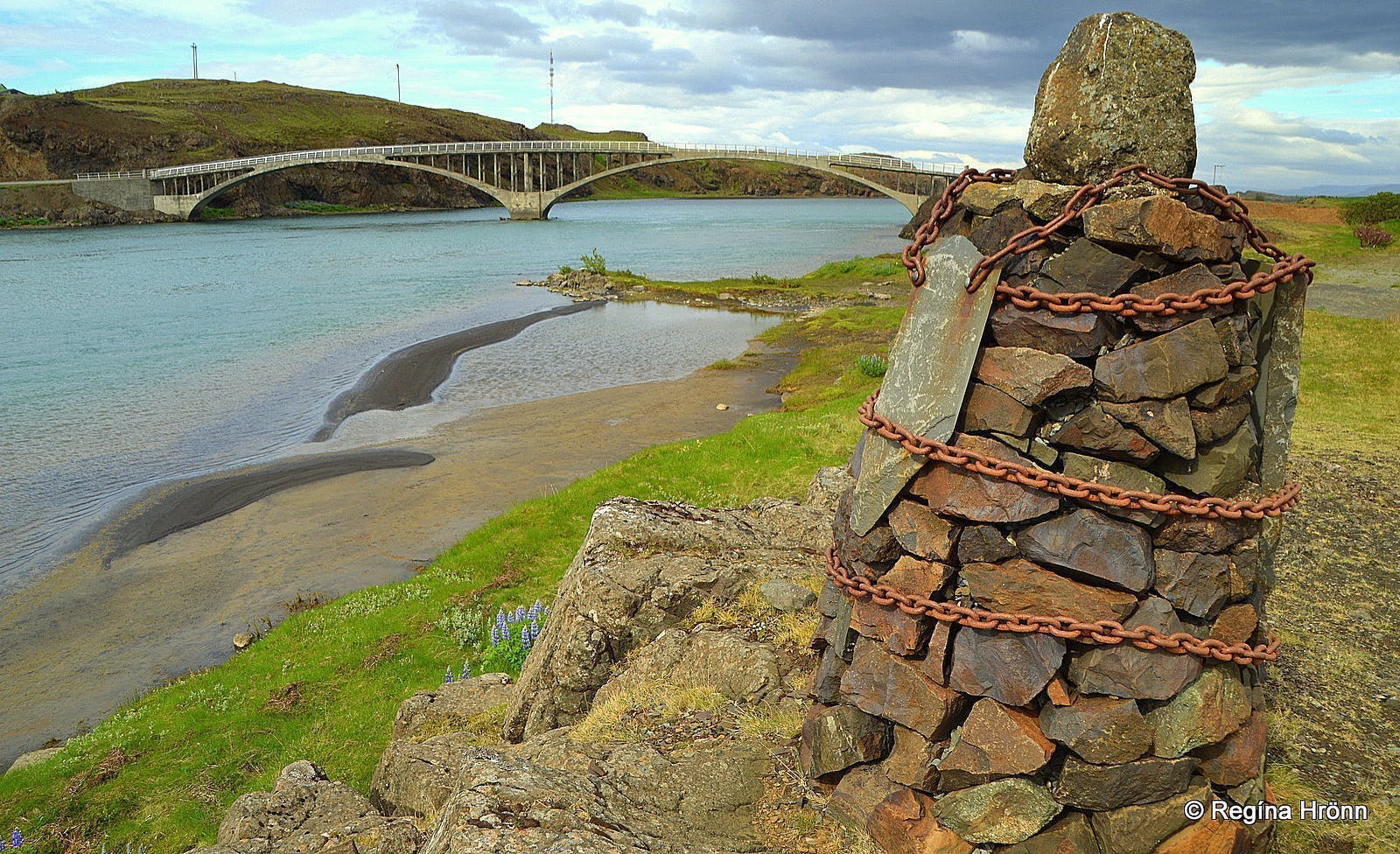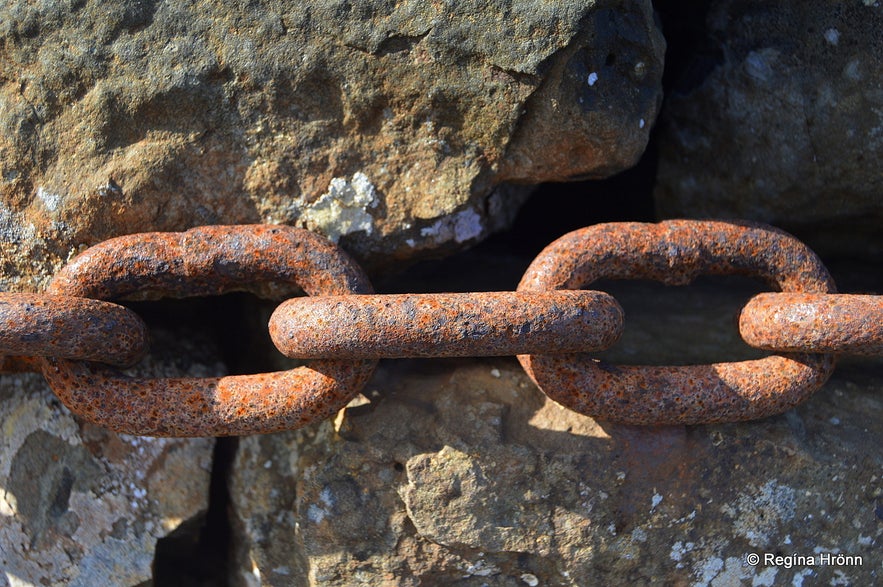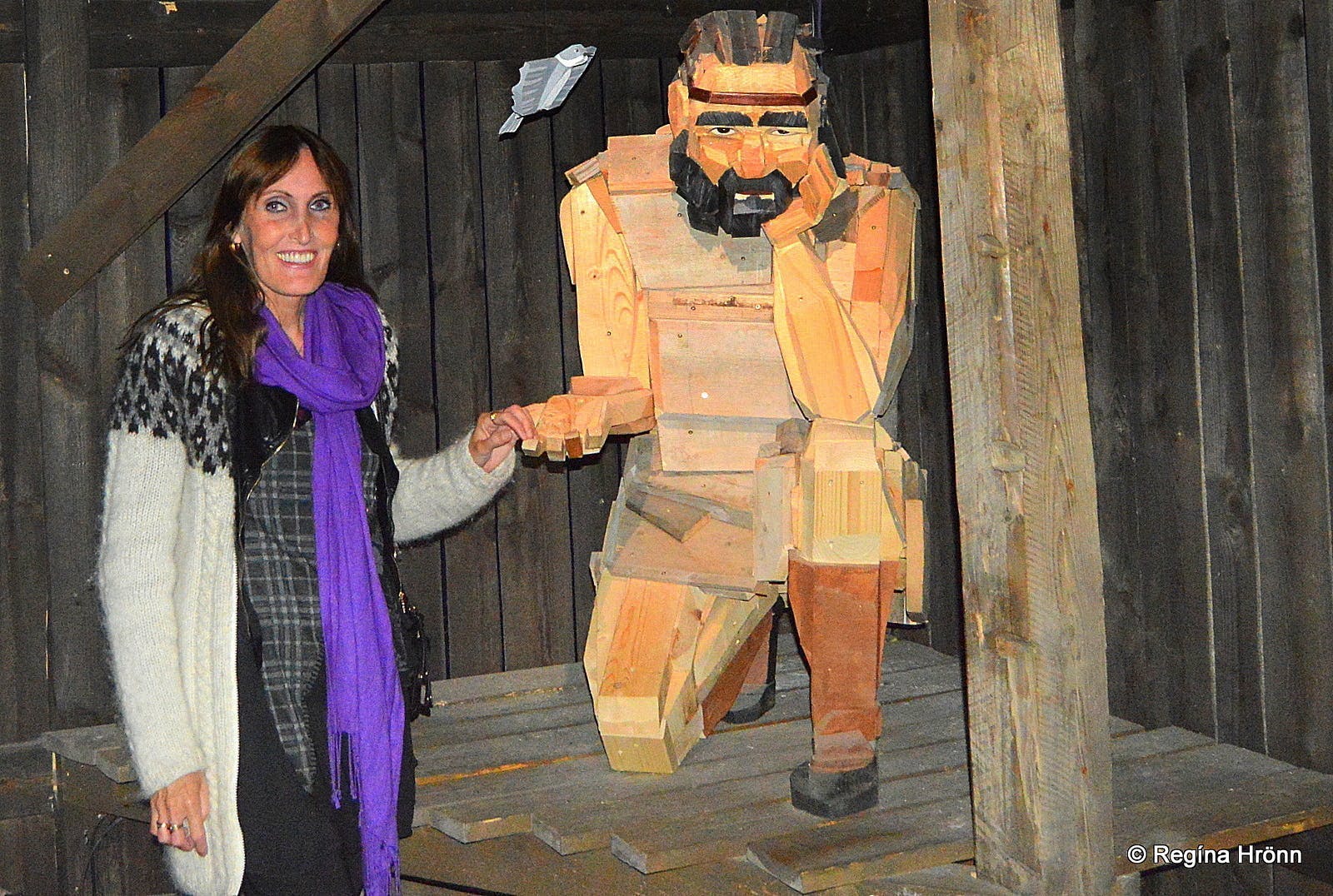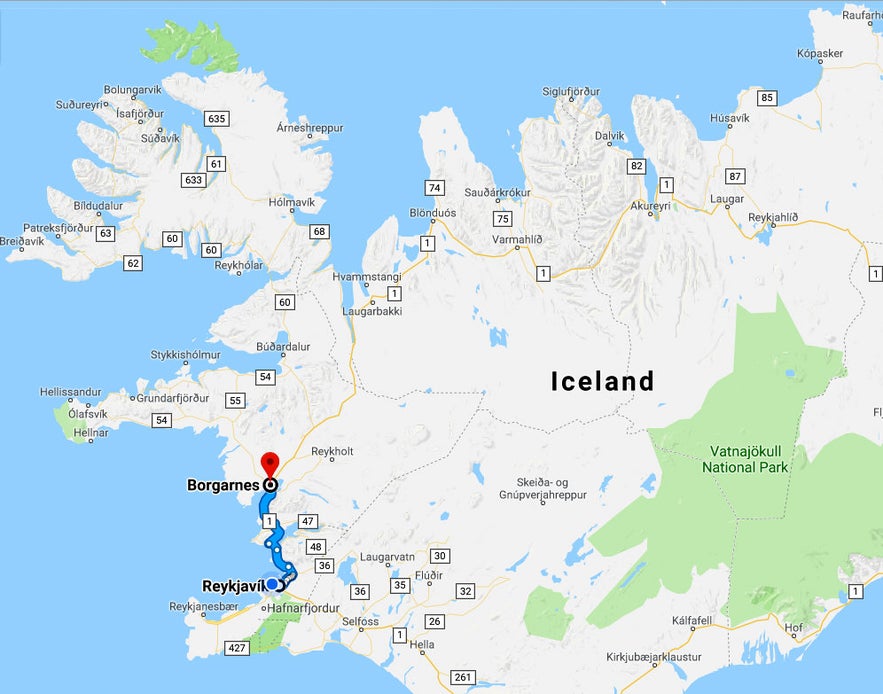
The Saga of the Viking Egill Skallagrímsson & the 9 Cairns in West-Iceland
- Landnámssetrið - the Settlement Centre
- The Settlement Exhibition
- Granastaðir - Grani's Farm- Cairn no. 1
- Skalla-Grímur and Brákarsund Strait - Cairn no. 2
- Skalla-Gríms Burial Mound and Park - Cairn no. 3
- Borg á Mýrum - Borg at Mýrar - Cairn no. 4
- Rauðanes - Bog Iron Peninsula - Cairn no. 5
- Ánabrekka - Áni Slopes - Cairn no. 6
- Einkunnir - Cairn no. 7
- Krumskelda - Cairn no. 8
- Hvítárvellir - White River Plains- Cairn no. 9
- My Viking Ancestry
Have you visited the 9 cairns from the Saga of the Viking Egill Skallagrímsson?
Borgarnes in West-Iceland (pop. approx. 1,880) was the home of one of the settlers in Iceland, Skalla-Grímur Kveldúlfsson, and his rascal son Egill, who was raised at Borg at Mýrar, just outside of Borgarnes town.
In Borgarnes town you will find the award-winning Settlement Centre in two of the oldest building in Borgarnes, with excellent exhibitions about the settlement of Iceland and the Saga of Egill, which is amongst the best-known Icelandic Sagas
Top photo: Egill Skallagrímsson as depicted at the Settlement Centre in Borgarnes.
By cairn no. 9 at Hvítárvellir
And both in Borgarnes and in the surrounding areas you can go on a cairn-hunt, as the curators of the Settlement Centre, Kjartan Ragnarsson and Sigríður Margrét Guðmundsdóttir, have erected 9 cairns at important locations from the Saga of Egill.
Landnámssetrið - the Settlement Centre

At the Settlement Centre in Borgarnes
There are two exhibitions at the Settlement Centre; one of them is on the settlement of Iceland in 874 (give or take a few years) until the establishment of Alþingi, the old Viking Parliament in 930 - and the other exhibition is about the life of the Viking Egill Skallagrímsson from the Saga of Egill, both of them equally interesting.
Skalla-Grímur Kveldúlfsson was one of the Norwegian settlers in Iceland, who sailed from Norway with his father Kveld-Úlfur. Kveld-Úlfur got ill on the way and died. Before he died he ordered his son, Skalla-Grímur, to take up habitation in Iceland where Kveld-Úlfur's coffin would land.
The coffin landed in Borgarnes and there Skalla-Grímur made a home at Borg in Mýrar just outside of Borgarnes.
At the Settlement Centre in Borgarnes
His son was Egill Skallagrímsson (approx. 910-990), one of the best-known Vikings and poets at this time. His story is depicted in the Saga of Egill. I read the Saga of Egill in college, so visiting the Settlement Centre was a good revision. The exhibition is excellent and makes for a very interesting visit.
At the Settlement Centre you can learn all about Egill Skallagrímsson and his story, but reading the Saga of Egill is strongly recommended as well to benefit the most from your visit. You can also download the app Locatify and listen to it before you arrive.
The Settlement Exhibition
The Settlement Exhibition depicts the settlement of Iceland from around 874 until the establishment of Alþingi, the old Parliament that the Vikings established back in 930. It tells the story of the Norwegian Vikings who settled in Iceland and why they left Norway. And why our Icelandic heritage is not only Norwegian but also Irish.
It is a very interesting exhibition, which takes some 30 minutes to complete with an audio guide. I recommend that you visit both these exhibitions and grab something to eat at the restaurant at the Settlement Centre before you check out the locations of the cairns.
Now let's go on a treasure hunt and look for all the 9 cairns!
Granastaðir - Grani's Farm- Cairn no. 1
Cairn no. 1 at Granastaðir
Cairn no. 1 is located at Granastaðir - Grani's Farm, above the camping area in Borgarnes, by ring-road 1. Grani was a crew member on Skalla-Grímur Kveldúlfsson's ship and settled at Granastaðir.
Egill Skallagrímsson was born at the close-by Borg, but his childhood playmate, Þórður Granason, grew up at Granastaðir farm.
Here in Sandvík the ill-fated ball game between Egill and Þórður in one team, and Skalla-Grímur in another team, took place. You can read this account in the Saga of Egill, chapter 40. Below I have written a description of the game, which led to the death of both Þórður and the bond-maid of Skalla-Grímur.
Skalla-Grímur and Brákarsund Strait - Cairn no. 2
Cairn no. 2 at Brákarsund
Cairn no. 2 is located at Brákarsund Strait and written on it in Icelandic is "Hér drekkti Skalla-Grímur Brák" meaning that Skalla-Grímur drowned Brák at this location.
Skalla-Grímur Kveldúlfsson had a bond-maid named Þorgerður Brák. She had been the nanny and foster mother to Egill, the son of Skalla-Grímur, and is described as big and strong as a man and skilled in magical arts.
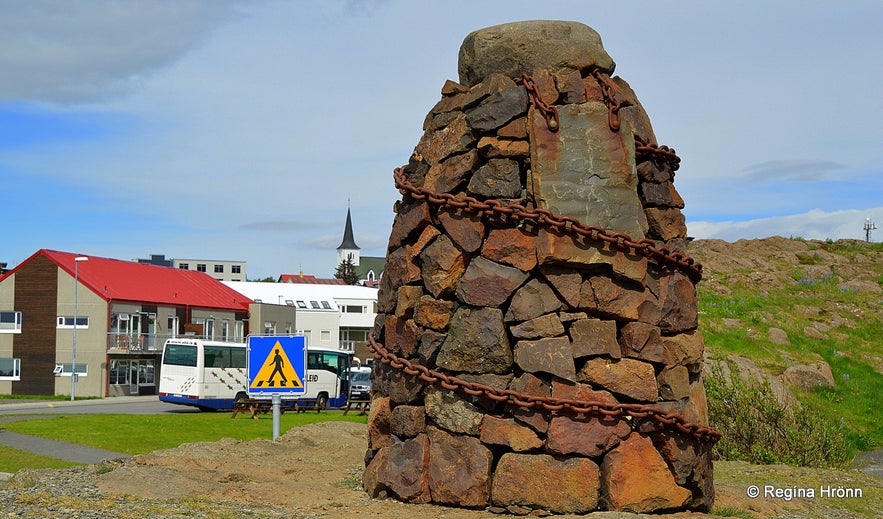
Cairn no 2 is easily accessible in Borgarnes town
One day in the wintertime when Egill was 12 years old Skalla-Grímur was playing a ball game at Borg with Egill and his friend, Þórður Granason. At first, the boys were winning, but later on, in the evening Skalla-Grímur got really strong and grabbed Þórður and tossed him onto the ground with such force that Þórður died.
He then went after his own son, Egill. Þorgerður Brák was watching the game and said: "Hamask þú nú, Skalla-Grímr, at syni þínum". It roughly translated means if Skalla-Grímur is now going to attack his own son.
Cairn no. 2 at Brákarsund
Skalla-Grímur got so angry that he let loose Egill and tried to grab Þorgerður Brák, but she ran. Skalla-Grímur chased her down to the sea where she jumped from a cliff into the sea and tried to reach the island outside of Borgarnes, now called Brákarey island.
Skalla-Grímur threw a big rock at her with such great force that Þorgerður Brák didn't resurface. Since that time the strait where she drowned is called Brákarsund - Brákar strait.
The monument Brákin stands tall on the hill above the Settlement Centre in remembrance of Þorgerður Brák and her ill fate.
Brákarsund monument
Brákarey island is off the shore of Borgarnes and is now connected to land by a bridge.
The island was named after Þorgerður Brák and so is the street Brákarbraut where she ran while trying to escape from the mad Skalla-Grímur.
You can visit cairn no. 2 and the monument by Brákarbraut just behind the Settlement Centre.
Skalla-Gríms Burial Mound and Park - Cairn no. 3
By cairn no. 3 Skalla-Grímshaugur
Cairn no. 3 is located by Skalla-Grímshaugur - Skalla-Grím's Burial-Mound. On it is written in Icelandic "Hér voru heygðir Skalla-Grímur og Böðvar" meaning that Skalla-Grímur and Böðvar were buried here.
Here you will find what we'd like to believe is the burial-mound of Skalla-Grímur Kveldúlfsson and his grandson Böðvar, the son of Egill Skallagrímsson.
Egill had the burial-mound of his father reopened and buried Böðvar, who was only a teenager when he drowned in Hvítá river, in the burial-mound with his grandfather.
Skalla-Grímshaugur burial mound
Skalla-Grímur had died of an unknown disease and drawings by the mound show how he was buried with his horse and weapons and tools.
An ornamental park is built around the mound, with a beautiful relief of grief-struck Egill Skallagrímsson carrying his drowned son Böðvar home on a horse, an astounding work by Anne-Marie Carl-Nielsen, which was donated to Iceland in 1963.
Egill Skallagrímsson
Visiting the ornamental park is a must when visiting Borgarnes.
Skalla-Grímur's Burial-Mound and cairn no. 3 are located in the centre of Borgarnes town
Borg á Mýrum - Borg at Mýrar - Cairn no. 4
Cairn no. 4 at Borg at Mýrar
Cairn no. 4 is located at Borg at Mýrar. The Norwegian Vikings Skalla-Grímur and his father Kveld-Úlfur sailed from Norway together in separate Viking ships to Iceland. As I have mentioned earlier then Kveld-Úlfur, the father of Skalla-Grímur, died on his way over to Iceland. He had a coffin made before he died and ordered his men to tell his son Skalla-Grímur, to settle land in Iceland where his coffin would land.
Kveld-Úlfur's coffin landed in Borgarnes and Skalla-Grímur settled in Borgarfjörður, and built a home at Borg at Mýrar. His son, Egill Skallagrímsson, lived at Borg after Skalla-Grímur died.
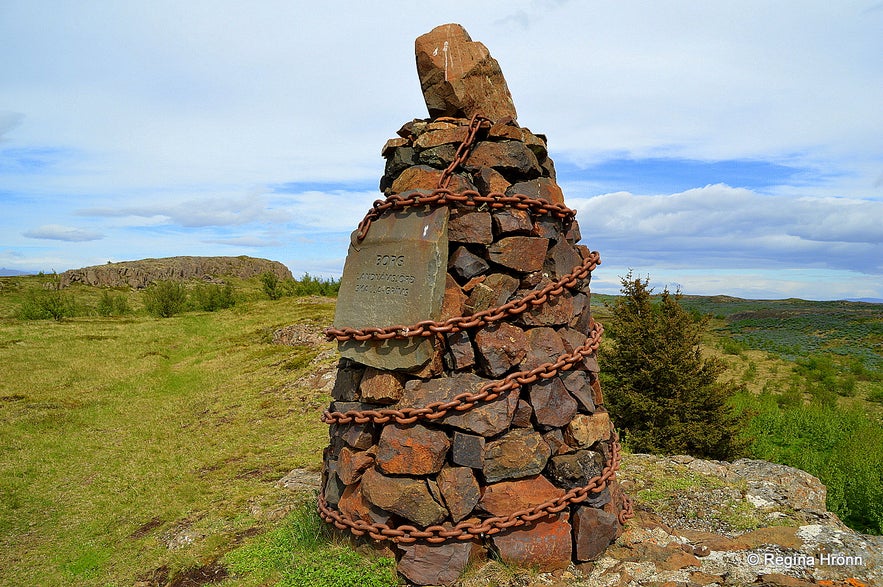
The cairn at Borg
On top of a cliff above Borg stands one of the 9 cairns. A trail from the left side of the church leads up to the cairn. Borg is actually named after this cliff, as the Icelandic word "borg" can mean both city and a rocky hill.
There has been a church at Borg since 1003, but the current church dates back to 1880. By Borg stands a prominent black sculpture by the noted Icelandic sculptor Ásmundur Sveinsson, Sonartorrek, named after the poem Egill Skallagrímsson wrote when he lost his 2 sons.
We don't know how his son Gunnar died, but Böðvar drowned and his death almost put Egill to his grave.
Sonatorrek by Ásmundur Sveinsson
Another prominent Icelander lived in the 13th century (from 1202-1206) at Borg - the Chieftain and influential writer, Snorri Sturluson, who is believed to have written the Saga of Egill.
One of the main characters of the Saga of Laxdæla, Kjartan Ólafsson, is buried in the graveyard at Borg. A gravestone with runic writings marks his ancient grave.
Kjartan was the grandson of Egill, the son of Egil's daughter Þorgerður, who coincidently convinced Egill to write Sonatorrek after he was so struck by grief that he didn't want to live anymore.
Borg stands north of Borgarnes by the intersection of ring-road 1 and road 54 leading to the Snæfellsnes peninsula. Coming from Borgarnes on ring-road 1 turn left on road 54. On your right-hand side, you will see Borg.
Rauðanes - Bog Iron Peninsula - Cairn no. 5
Cairn no. 5 at Rauðanes
Cairn no. 5 can be found right by the farm at Rauðanes - Bog Iron Peninsula. Written on it in Icelandic is "Hér stóð smiðja Skalla-Gríms" meaning that here Skalla-Grímur built a smithy. Skalla-Grímur is described as having been a very skillful iron-smith in the 30th chapter of the Saga of Egill.
Here in the peat bogs at Rauðanes peninsula, Skalla-Grímur found bog iron from which he smelted a great deal of iron. It is said that he could not find a stone hard and smooth enough to use as a stithy. To find such a stone he roved to the islands in the Midfirth and dove to find a suitable stone.
He found a stone which can still be seen close to cairn no. 5. I could not find it during my visit to this area though, will look harder next time around. It is said to be so heavy that 4 men can scarcely lift it.
Skalla-Grímur as depicted at the Saga Museum in Reykjavík - it is also a highly recommended visit
My photo above of Skalla-Grímur Kveldúlfsson I took at the Saga-Museum in Reykjavík, where you can visit very lifelike wax figures of influential characters in the Icelandic Sagas and other Icelandic stories.
The Rauðanes cairn is located off road 54, by the end of road 532.
Ánabrekka - Áni Slopes - Cairn no. 6
Cairn no. 6 at Ánabrekka
At Ánabrekka - Áni Slopes you will find cairn no. 6. Written on it in Icelandic is "Landnámsjörð Ána skipverja Skalla-Gríms" meaning that Áni, a crew member on board Skalla-Grímur's Viking ship, settled land here.
Áni was one of 9 crew members onboard Skalla-Grímur's Viking ship. They were all fleeing the Norwegian king Haraldur hárfagri - Harald Fair Hair, like so many of the settlers of Iceland.
The son of Áni was named Ögmundur and he lived at Ánabrekka - Áni Slopes when Egill Skallarímsson lived at Borg.
Cairn no. 6 at Ánabrekka
Egill lost his wife at that time and went to live with his foster daughter at Mosfell.
His son, Þorsteinn, took over his father's position at Borg. At the same time Steinar, the son of Önundur took over at Áni Slopes. Steinar repeatedly encroached upon the land of Þorsteinn.
This led to a dispute between these two Vikings and is this dispute described in the final chapters of the Saga of Egill.
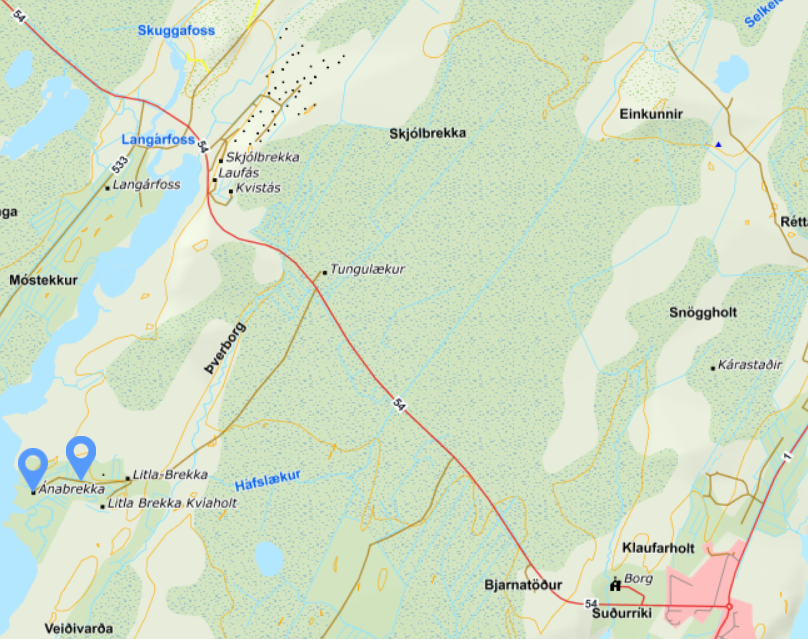
Einkunnir - Cairn no. 7
Cairn no. 7 at Einkunnir
Cairn no. 7 stands on top of a hill at Einkunnir with a beautiful view of the surrounding area. This is the only cairn where a short hike is needed - all the other cairns are easily accessible and stand by the road.
I visited this cairn when I went berry picking at Einkunnir one autumn.
On the cairn is written in Icelandic "Skinu við tólf spjót og skildir nokkurir" meaning, that the shine from 12 spears and some shields could be seen. I found this sentence in the 88th chapter of the Saga of Egill, when Íri told Þorsteinn, the son of Egill Skallagrímsson, that he had walked on top of Einkunnir and looked for sheep, but had also "seen in the wood above the winter road the gleam of 12 spears and some shields".
Steinar had apparently waited in ambush with 11 men up on Einkunnir.
By cairn no. 7 at Einkunnir
The 7th cairn used to be located at Álftanes - Swan Peninsula, where Skalla-Grímur had a good hunting ground. There Yngvar, Egill's other grandfather, was offered to live when he settled in Iceland.
And it was at the Swan Peninsula that Egill, who had been prohibited to go to a party at his grandfather's place, as he was only 3 at the time, rode alone to the party and composed his first poem.
I looked for the cairn at the Swan Peninsula, but the farmer told me that there had been so much traffic through his land that he had had the cairn removed. It is a pity though as it is an important location in the Saga of Egill. But we must respect the wishes of the farmers in Iceland.
The view-dial at Einkunnir
Close to the cairn, you will also find one of the many beautiful view-dials in Iceland. The view-dial at Einkunnir was designed by Jakob Hálfdanarson, my father-in-law.
Krumskelda - Cairn no. 8
Cairn no. 8 at Krumskelda
Cairn no. 8 is located at Krumskelda - Krum's Bog and written on it in Icelandic is "Hér liggur silfur Skalla-Gríms" - here lies the silver of Skalla-Grímur! Skalla-Grímur and his son, Egill, were known for being thrifty Vikings.
When Egill was in England the king Aðalsteinn gave him a considerable sum of silver to give to Skalla-Grímur as a payment for the death of Þórólfur, the son of Skalla-Grímur, in a battle.
Egill did not share the silver with his father and Skalla-Grímur resented this.
Cairn no. 8 at Krumskelda
It is written in Chapter 60 in the Saga of Egill how Skalla-Grímur, on the night before he died, rode into the night with a large copper kettle and a chest.
It is believed that he buried his treasures here at Krum's Bog so that Egill would not get hold of them, and covered them with a huge flat stone.
To visit the 8th cairn get off ring-road 1 and drive along road 530. I passed it on my first try to find it, but it is located halfway to Krumshólar. Be on the lookout for it as it is easily passed.
Hvítárvellir - White River Plains- Cairn no. 9
Cairn no. 9 at Hvítárvellir
The 9th and final cairn stands by Hvítá glacial river on Hvítárvellir - White River Plains. Written on this cairn in Icelandic is "Hér var kaupstefna til forna" - here was a trading market in ancient times. Every summer a popular trading market was held at this location when merchants from Norway sailed in and sold their merchandise.
Böðvar, the son of Egill, drowned here in Hvítá glacial river when he was only 14 years old and was returning back home to Borg from the market. The boat was filled with wood that Egill had bought at the market. The whole crew (6 men) drowned at the mouth of the river. What a tragic event :(
Cairn no. 9 at Hvítárvellir
Egill Skallagrímsson grieved deeply for his young son and wrote his most famous poet Sonatorrek - the Lament for my sons.
It was also on these plains that Egill killed an 11-year-old boy. It was Egil's first killing - at the age of 7!!
The cairn is by Hvítárbrú bridge along road 53.
--------------
Kudos to Kjartan and Sigríður at the Settlement Centre for putting so much effort and love into introducing the Saga of Egill to us! I really admire their work and applaud such visionary people in my country, who get an interesting idea and follow it through. Another entrepreneur like this is Jóhannes Viðar at the Viking Village, who has also put a lot of work and effort into creating a Viking world in Hafnarfjörður town in the Great-Reykjavík area.
My Viking Ancestry
At the Settlement Centre
Skalla-Grímur Kveldúlfsson was my ancestor according to Íslendingabók - the Book of Icelanders:
Skallagrímur Kveldúlfsson (863) Bera Yngvarsdóttir (870)
Egill Skallagrímsson 0910
Þorgerður Egilsdóttir 0939
Þorbjörg "digra" Ólafsdóttir 0960
Kjartan Ásgeirsson 1000
Þorvaldur Kjartansson 1055
Þórður Þorvaldsson 1075 - 1143
Snorri Þórðarson 1125 - 1194
Þorvaldur Snorrason 1160 - 1228
Einar Þorvaldsson 1227 - 1286
Ónefnd Einarsdóttir 1250
Eiríkur Sveinbjarnarson 1277 - 1342
Einar Eiríksson 1320 - 1382
Björn "Jórsalafari" Einarsson 1350 - 1415
Kristín Björnsdóttir 1374 - 1468
Sólveig Þorleifsdóttir 1415 - 1479
Jón Sigmundsson 1455 - 1520
Helga Jónsdóttir 1511 - 1600
Jón Kráksson 1533 - 1622
Sturli Jónsson 1590
Jón Sturluson 1625 - 1700
Einar Jónsson 1676 - 1745
Guðríður Einarsdóttir 1726 - 1772
Oddur Guðmundsson 1770 - 1841
Svanborg Oddsdóttir 1814 - 1877
Helga Ásmundsdóttir 1841 - 1910
Ásmundur Sigurðsson 1868 - 1919
Kjartan Ásmundsson 1903 - 1977
My father Ragnar Kjartansson 1942 - 2008
Regína 1965
Borgarnes town is located in West Iceland, some 74 km away from Reykjavík through Hvalfjarðargöngin - the Whale Bay tunnel. To reach this area you can rent a car in Reykjavík and drive to Borgarnes in an hour.
Don't miss the chance of getting acquainted with the Viking Egill Skallagrímsson and visit the Settlement Centre!
There are more interesting sights in this area and the popular Silver Circle traverses Borgarfjörður.
In this area, you can f.ex. visit:
The spectacular Silver Circle of West-Iceland
Snæfellsnes peninsula is also close by, and to visit the many interesting sights of the ever so popular peninsula you drive through Borgarnes town and make an immediate turn on road 54 after you leave the village.
Have a lovely time in West Iceland :)
I have written another travel-blog about Viking Ruins and Burial Mounds I have visited on my Travels in Iceland - which is a list of all the archaeological sites and burial mounds, which I have visited in Iceland. I am no expert in this field though, Iam just a layman travelling in my country showing you places which I find to be interesting and beautiful.
Читать другие блоги
Загадка отеля Radisson 1919
Из истории славного города Рейкьявика Каждый умный человек знает, что свастика, как древний положительный символ движения, благоденствия, солнцеворота, не имеет ничего общего с преступным нацистскимЧитать далееАвтобусы в Рейкьявике и Исландии
Привет, ребята Сейчас очень быстро, без лирических отступлений, расскажу вам об общественном транспорте Рейкьявика - автобусах Stræto. Эти знания вам очень пригодятся, если, приехав в Рейкьявик, выЧитать далееКак Исландия вдохновила легендарных рокеров
Рассказ о том, как песня об Исландии стала классикой рока. Я очень люблю музыку. А музыка - это одна из причин, почему я люблю Исландию. Но история эта не про исландскую группу, а про легенд рок-нЧитать далее

Загрузите приложение крупнейшего туристического портала Исландии на свой телефон, чтобы управлять всей поездкой в одном месте.
Отсканируйте этот QR-код с помощью камеры телефона и нажмите на появившуюся ссылку, чтобы всегда иметь доступ к крупнейшему туристическому порталу Исландии в своем кармане. Введите свой номер телефона или адрес электронной почты, чтобы получить SMS или электронное письмо со ссылкой на скачивание.


